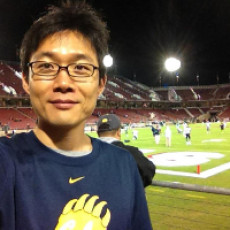2013 Simons Institute Research Fellow: Sang-Yun Oh
August 27, 2013
Contact: Linda Vu, +1 510 495 2402, lvu@lbl.gov
As the first Simons Institute Research Fellow (Theoretical Foundations of Big Data Analysis) at Berkeley Lab, Sang-Yun Oh will be working with the Computational Research Division’s Future Technologies Group to develop large-scale data analysis methodologies and algorithms. His research interests include graphical models estimation and correlation structure recovery for high dimensional data, as well as applying these methods for analyzing real datasets from biology, finance, and other scientific disciplines.
Born in Korea and raised in Southern California, Oh came to the Bay Area in the late 1990s to attend UC Berkeley, where he earned a degree in physics. He then worked for three-plus years as a scientific engineer in the Berkeley Lab’s Life Sciences Division before joining the world of Internet advertising. Eventually, he went back to school and earned a doctorate in computational and mathematical engineering at Stanford University.
“As an undergrad at UC Berkeley, I was involved in a cosmic microwave background (CMB) mapping project. I was fortunate to have participated in the experimental as well as the data analysis aspects of the project, and this experience allowed me to realize my interest in data analysis and computing,” says Oh.
In his spare time, Oh enjoys running, cycling, and relaxing in parks.
Established at the University of California, Berkeley (UC Berkeley) in July 2012, the Simons Institute aims to explore deep unsolved problems about the nature and limits of computation by bringing together some of the world’s leading researchers in computer science and related fields. The Institute offers about 16 fellowships each semester in connection with a specific program, and several joint fellowships with partner institutions, including Berkeley Lab.
About Berkeley Lab
Founded in 1931 on the belief that the biggest scientific challenges are best addressed by teams, Lawrence Berkeley National Laboratory and its scientists have been recognized with 16 Nobel Prizes. Today, Berkeley Lab researchers develop sustainable energy and environmental solutions, create useful new materials, advance the frontiers of computing, and probe the mysteries of life, matter, and the universe. Scientists from around the world rely on the Lab’s facilities for their own discovery science. Berkeley Lab is a multiprogram national laboratory, managed by the University of California for the U.S. Department of Energy’s Office of Science.
DOE’s Office of Science is the single largest supporter of basic research in the physical sciences in the United States, and is working to address some of the most pressing challenges of our time. For more information, please visit energy.gov/science.










